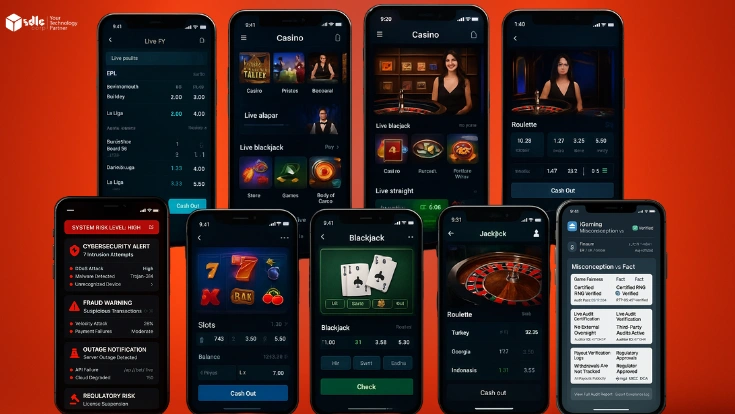Introduction
The landscape of casino gaming is rapidly evolving, driven by advances in technology and the growing demand for more interactive and engaging experiences. One of the most significant trends in this evolution is the incorporation of social features into casino game mechanics. As players increasingly seek to connect with others and share their gaming experiences, casino game developers are integrating multiplayer and social elements to enhance engagement, retention, and overall satisfaction.
This blog will explore how social features are being integrated into casino games, the benefits they offer, and the challenges involved in their development. We will also examine the role of casino game development companies in creating these socially interactive experiences, the technical considerations that come into play, and the potential future of social casino gaming.
Transform Your Gaming Experience Today!
A Casino Game Development Company specializes in creating immersive and engaging casino games for online and offline platforms.

The Rise of Social Features in Casino Games
The Appeal of Social Interaction in Gaming
Gaming has always had a social component, whether it’s the camaraderie of a poker table or the shared excitement of a slot machine jackpot. With the advent of online gaming, this social aspect has expanded dramatically, allowing players to connect with others from around the world. For many players, the social interaction provided by multiplayer and social features is just as important as the gameplay itself.
When you hire professional casino game developers, you’re bringing in experts who understand the importance of these social elements and can integrate them seamlessly into your gaming platform.
Incorporating social features into casino games adds a new dimension to the gaming experience. Players can now compete against friends, share their achievements, and participate in multiplayer tournaments. These social elements create a sense of community and belonging, making the gaming experience more enjoyable and immersive.
Types of Social Features in Casino Games
Social features in casino games can take many forms, ranging from basic chat functions to complex multiplayer mechanics. Some of the most common social features include:
- Multiplayer Modes: Allowing players to compete against each other in real-time, whether in table games like poker and blackjack or in multiplayer slots where players can share in bonus rounds or compete for the highest score.
- Social Sharing: Enabling players to share their achievements, wins, and progress on social media platforms like Facebook, Twitter, and Instagram. This feature not only enhances the player’s sense of accomplishment but also acts as a marketing tool for the game.
- Leaderboards: Displaying player rankings based on performance, winnings, or other metrics. Leaderboards encourage competition and motivate players to improve their skills and climb the ranks.
- Chat Functions: Providing players with the ability to communicate with each other during gameplay. This can include text chat, voice chat, or even video chat, depending on the game’s platform and capabilities.
- Gifting and Rewards: Allowing players to send gifts, bonuses, or rewards to friends within the game. This feature fosters a sense of community and encourages players to engage with each other.
- Guilds and Clans: Enabling players to form or join groups with shared goals and compete against other groups. This feature is common in mobile and social casino games, where players can collaborate to achieve collective rewards.
- Tournaments and Competitions: Organizing timed events where players can compete for prizes, such as cash, virtual currency, or exclusive in-game items. Tournaments can be structured as single-player challenges or multiplayer showdowns.
The Benefits of Social Features
The integration of social features into casino games offers several benefits for both players and developers:
- Enhanced Player Engagement: Social features make the gaming experience more interactive and engaging, leading to longer play sessions and higher retention rates.
- Increased Player Retention: Players who feel connected to a community are more likely to continue playing. Social features create a sense of belonging and encourage players to return to the game regularly.
- Monetization Opportunities: Social features can drive in-game purchases, such as buying gifts for friends, entering tournaments, or purchasing cosmetic items. This can significantly increase the game’s revenue.
- Viral Marketing: Players sharing their achievements or inviting friends to play can lead to organic growth and increased visibility for the game. Social sharing features turn players into brand advocates.
- Improved Player Experience: Social features create a more dynamic and enjoyable gaming experience. Players can celebrate their wins with others, seek advice, and build relationships, all of which enhance their overall satisfaction.
The Role of Casino Game Development Companies
Designing Social Casino Games
Casino game development companies are at the forefront of incorporating social features into casino games. The design process involves not only creating engaging gameplay but also integrating social elements that enhance the player experience. This requires a deep understanding of player behavior, social dynamics, and the technical challenges involved in real-time multiplayer gaming.
Key Development Considerations
When developing social casino games, several key considerations must be addressed:
- User Interface (UI) and User Experience (UX) Design: The UI and UX must be designed to accommodate social features without overwhelming the player. Social elements should be easily accessible, intuitive, and seamlessly integrated into the gameplay.
- Multiplayer Infrastructure: Developing multiplayer modes requires robust backend infrastructure capable of handling real-time data transmission, player matchmaking, and synchronization across multiple devices. This is particularly challenging for games with large player bases or those that require low latency.
- Security and Fairness: Ensuring the security and fairness of social casino games is critical. Developers must implement measures to prevent cheating, protect player data, and ensure that all players have an equal opportunity to win.
- Cross-Platform Compatibility: Social features must be accessible across all platforms, whether players are on desktop, mobile, or console. Developers need to ensure that social interactions are seamless, regardless of the device used.
- Compliance and Regulation: Social casino games must comply with local and international regulations, particularly regarding data privacy and responsible gambling. Developers must ensure that their games adhere to these regulations while still offering a compelling social experience.
Casino Game Development Services
Casino game development companies offer a range of services to bring social casino games to life. These services include:
- Custom Game Development: Creating bespoke social casino games tailored to the specific needs of the client, whether it’s a new game concept or the integration of social features into an existing game.
- Multiplayer Game Development: Developing real-time multiplayer modes that allow players to compete against each other or collaborate in shared experiences.
- Social Feature Integration: Implementing chat functions, leaderboards, social sharing, and other social elements that enhance the gaming experience.
- Testing and Quality Assurance: Conducting extensive testing to ensure that the game runs smoothly, social features function correctly, and the player experience is consistent across platforms.
- Compliance and Certification: Ensuring that the game meets all regulatory requirements and obtaining the necessary certifications for legal operation in various jurisdictions.
Optimize casino servers with expert developers!
Hiring skilled casino game developers is crucial for creating engaging and successful gaming experiences.
Technical Challenges in Developing Social Casino Games
Real-Time Data Processing
One of the biggest technical challenges in developing social casino games is real-time data processing. Multiplayer games require the synchronization of data across multiple players, devices, and servers. This involves managing the transmission of game state information, player actions, and social interactions in real-time, often with minimal latency.
To achieve this, developers must invest in scalable and reliable backend infrastructure. Cloud-based servers, content delivery networks (CDNs), and load balancing are often used to ensure that the game can handle large numbers of players simultaneously without performance issues.
Developing social casino games comes with its own set of technical challenges, especially when dealing with real-time data processing and ensuring robust security and privacy. As a leading casino game development company, we have the expertise to tackle these complexities and create seamless, secure gaming experiences.
Security and Privacy
With the integration of social features, security and privacy become paramount. Developers must ensure that player data is protected through encryption, secure authentication, and robust access controls. Additionally, measures must be in place to prevent hacking, cheating, and other forms of exploitation that could undermine the game’s integrity.
Privacy concerns are also critical, particularly when social features involve sharing personal information or connecting to social media accounts. Developers must comply with data protection regulations, such as the General Data Protection Regulation (GDPR) in Europe, and ensure that players have control over their data and privacy settings.
Player Matching and Balance
In multiplayer casino games, player matching and balance are essential to ensuring a fair and enjoyable experience. Developers must create algorithms that match players of similar skill levels, bankrolls, or preferences to prevent imbalances that could lead to frustration or unfair advantages.
Balancing the game itself is also crucial. Social casino games should offer a mix of challenge and reward that keeps players engaged without feeling unfair or predatory. This involves fine-tuning the game’s mechanics, payout structures, and progression systems to cater to a diverse player base.
Cross-Platform Integration
Ensuring that social features function seamlessly across different platforms is another significant challenge. Players may access the game from various devices, including smartphones, tablets, desktops, and consoles. Developers must ensure that social interactions, such as chat, leaderboards, and multiplayer modes, are consistent and accessible across all platforms.
Cross-platform integration also involves ensuring that players can switch between devices without losing progress or social connections. This requires robust data synchronization and cloud storage solutions to keep player data up-to-date and accessible from any device.
The Impact of Social Features on Casino Game Mechanics
Enhancing Player Engagement and Retention
Social features have a profound impact on player engagement and retention. By fostering a sense of community and competition, these features encourage players to spend more time in the game, return more frequently, and invest in in-game purchases. For example, leaderboards and multiplayer tournaments tap into players’ competitive instincts, motivating them to improve their skills and climb the rankings.
Social interactions also create a more immersive and enjoyable experience. Players who can chat with friends, share their achievements, or receive encouragement from other players are more likely to remain engaged and satisfied with the game. This social connection is especially important in the context of casino games, where the excitement of winning can be amplified by sharing the moment with others.
Driving In-Game Monetization
Social features are not just about enhancing the player experience—they also offer significant monetization opportunities. Developers can implement in-game purchases tied to social interactions, such as buying gifts for friends, entering premium tournaments, or purchasing cosmetic items to showcase on leaderboards. These features create a sense of exclusivity and personalization, encouraging players to spend money to enhance their social presence.
Additionally, social sharing features can serve as powerful marketing tools. Players who share their achievements or invite friends to join the game can drive organic growth and increase the game’s visibility. This viral marketing effect can lead to a larger player base and, consequently, higher revenue.
Creating New Game Dynamics
The integration of social features also introduces new game dynamics that can change the way players interact with the game. For example, multiplayer modes allow players to collaborate or compete in real-time, creating a more dynamic and unpredictable gaming experience. These interactions can lead to new strategies, alliances, and rivalries, adding depth and variety to the gameplay.
Social features can also influence the pacing and structure of the game. Tournaments, timed events, and social challenges create a sense of urgency and excitement, encouraging players to participate and stay active in the game. These events can be tied to seasonal content or special promotions, keeping the game fresh and engaging over time.
The Future of Social Casino Gaming
The Role of Emerging Technologies
As technology continues to evolve, so too will the possibilities for social casino gaming. Emerging technologies such as virtual reality (VR), augmented reality (AR), and artificial intelligence (AI) are poised to revolutionize the way social features are integrated into casino games.
- Virtual Reality (VR): VR can create immersive social environments where players can interact with each other in a virtual casino. Players can walk around, sit at tables, and engage in real-time conversations with other avatars, creating a more lifelike and engaging experience.
- Augmented Reality (AR): AR can enhance social interactions by overlaying digital elements onto the real world. For example, players could see virtual slot machines or card tables in their physical environment, allowing them to play with friends in a shared space, even if they are miles apart.
- Artificial Intelligence (AI): AI can be used to create more personalized and responsive social experiences. For example, AI-driven chatbots could facilitate conversations, provide tips, or even act as virtual opponents in multiplayer games. AI can also be used to analyze player behavior and preferences, tailoring social features to individual players.
Expanding Social Features in Mobile and Online Casinos
The growth of mobile and online casinos presents new opportunities for social features. Mobile gaming, in particular, has seen a surge in popularity, driven by the convenience of playing on-the-go and the increasing power of smartphones and tablets. Social features can be seamlessly integrated into mobile casino games, offering players the ability to connect with friends, participate in tournaments, and share their achievements from anywhere.
Online casinos are also exploring new ways to incorporate social elements into their platforms. Live dealer games, for example, allow players to interact with real dealers and other players in real-time, creating a more authentic and social experience. These games are becoming increasingly popular, especially in markets where traditional casinos are less accessible.
Regulatory Challenges and Considerations
As social casino gaming continues to grow, so too will the regulatory challenges associated with it. Developers and operators must navigate a complex landscape of regulations related to data privacy, responsible gambling, and consumer protection. Ensuring compliance with these regulations is critical to maintaining the trust of players and avoiding legal issues.
One area of particular concern is the potential for social features to encourage excessive spending or gambling behavior. Developers must implement safeguards, such as spending limits, self-exclusion options, and responsible gambling messages, to protect vulnerable players. Additionally, transparency in how social features are monetized is essential to maintaining ethical standards and avoiding accusations of predatory practices.
The Importance of Community Management
As social features become more integral to casino games, the role of community management will become increasingly important. Developers and operators must actively engage with their player communities, addressing concerns, facilitating positive interactions, and fostering a welcoming and inclusive environment. Effective community management can enhance player loyalty, reduce churn, and create a more positive overall experience.
Community management also involves moderating social interactions to prevent toxic behavior, cheating, and other issues that could harm the player experience. This requires a combination of automated tools and human oversight to ensure that social features are used in a constructive and enjoyable manner.
Unlock Expert Game Development Services Today!
Game development services offer end-to-end solutions for creating engaging, high-quality games across platforms.

Conclusion
The integration of social features into casino game mechanics represents a significant shift in the way players engage with casino games. By incorporating multiplayer modes, social sharing, leaderboards, and other interactive elements, developers can create more engaging, dynamic, and enjoyable experiences that resonate with modern players.
When you hire professional casino game developers, you gain access to skilled experts who can seamlessly incorporate these social features into your game. Here’s how our developers can enhance your casino game:
Casino game development companies play a crucial role in bringing these social casino games to life. From designing intuitive user interfaces to developing robust multiplayer infrastructure, these companies must navigate a range of technical and regulatory challenges to create games that are both fun and fair. As technology continues to advance, the potential for even more immersive and interactive social casino games will only grow.














